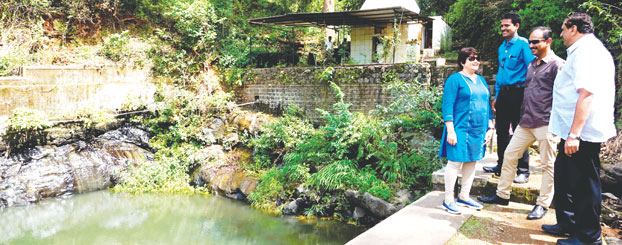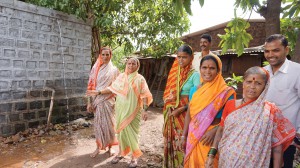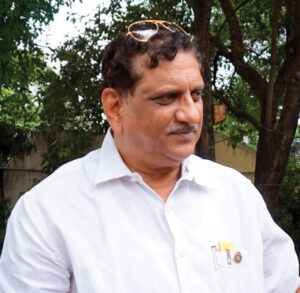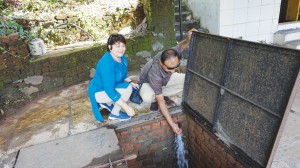Water facilitates marriages!

What the availability of water near their doorstep means to rural women was driven home to the head honcho of a Pune company who had donated money to enable RC Pune Laxmi Road, D 3131, to implement a water project that tapped spring water from the hills and reached it to the villagers.
The MD inaugurated the project and on the same day a marriage was being celebrated in the village. The villagers said that in this village it was virtually impossible to get a young man married because nobody wanted their daughter to walk for 8–9 km to fetch drinking water. “Jaise pani aa gaya hamare yaha pehli shadi ho rahi hei (once the water came, the first marriage is taking place),” says Sadanand Bhagwat, past president of the club. “The MD was so happy that he said whenever you require money for such projects, come to me,” he adds.
The water projects that RC Pune Laxmi Road has taken up with such enthusiasm was started when his wife, Deepa Bhagwat, was the Club President in 2009. In the last six years 65 natural streams in the Kolvan valley, about 65 km from Pune, have been tapped to reach water to over 10,000 people in nearby hamlets.
“We were searching for a need-based project away from Pune city and partnered with the NGO Gomukh which was implementing watershed projects in this area,” recalls Deepa. When they surveyed the Kolvan Hills area, a lush green mountainous region at a height of 3,000 ft., “we found that there are any number of streams that can be tapped. We could build a small reservoir at different points and bring down the water through gravitational force.”
The biggest plus point in this electricity deficit region was that electricity wouldn’t be needed to bring down the water. Seventeen projects have been completed tapping water from 65 natural streams. Through a pipeline the water from 4–5 streams is brought down and collected in a small kund or pond about 4 x 4 ft or 6 x 6 ft in size, which has a capacity to hold about 40,000 litres of water. Wired filters are put in place to keep out the mud and silt which comes down the mountains. Then through GI or hi-density pipe-lines the water is taken to the hamlets where a sturdy storage tank, complete with water proofing, is built to hold about 10,000 litres of water. This daily supply is sufficient to meet the drinking, cooking and other household needs of 150–200 villagers.
 Rotary is our passion
Rotary is our passion

When I ask Sadanand Bhagwat and his wife Deepa, both past presidents of RC Pune Laxmi Road, if their business is not affected by their giving so much time for Rotary projects, he says, “Our business is well established now and runs smoothly even if we don’t attend to it daily. But Rotary is our passion.”
A Level 3 donor — this year he has donated $30,000 to TRF — Bhagwat keeps a low profile and has to be coaxed to get into a picture frame. But get him talking on water for the adivasis of the Kolvan hills region, or Matoshree, home for the elderly, which he and other Rotarians have adopted with such commitment, and he is a transformed person.
As we drive up the hills, he explains that this area has no catchment and all the water coming down the mountain streams just runs away. “I found there was just a 10 ft opening through which a massive quantity of water was going out. All we did was close the 10 ft opening and now about 30 to 40 lakh litres of water is stored in this bund. First the water recharged the ground water in these areas and now it remains above the surface. The project cost only Rs 7–8 lakh. I told the owner of the company with which I work to donate the amount … and with the money we made one more project too.”
Manna for villagers
This pristine water, packed with minerals, is manna for the inhabitants of the villages, particularly the women and girls who had to walk for at least 2–3 km, if not more, either way, in the mountainous region to fetch water. As only those streams that generate a copious supply of water in the months March–May are tapped, the villagers have safe drinking water round the year.
Bhagwat, who runs a construction business, specialising in industrial sheds (Deepa is an interior decorator) explains that the cost of each project is Rs 3.5–5 lakh and raising money has never been a problem. He is also deft at getting his suppliers and clients to contribute either in kind or cash to help the projects done by his club, including giving comfort and dignity to senior citizens at Matoshree, a home for the elderly in Pune. But more of that wonderful project in another issue of Rotary News!
Depending on the height of the mountain streams and the size of the village — (population varies from 150 to 500) a pipeline of 1,000–1,500 ft or 5,000 ft has to be laid. The cost of each project depends on how far and how high the natural springs are. “In one or two places the water pressure was so high that the water overflowed the tank, so we put another pipe and connected that tank down to serve another hamlet, getting one spring to serve two villages,” he says.
Till now Rs 90 lakh have been spent on these water projects, with the money being raised either through the club, private donors or matching grants from TRF. With 17 projects over, five more are in the pipeline.
Women benefit most
The 10,000-odd villagers who have benefited from these water projects are mostly farmers or daily labourers. The area has no municipal water supply, and earlier the women had to trek 3–4 km in this hilly region to fetch water. “We did a health check-up here and found that almost all the women suffered from joint pains, back ache and low haemoglobin. And if young girls have to walk 7–8 km to fetch water, when are they going to go to school? The education of the girl child was suffering, so now we start a new project only when the villagers promise to send their daughters to schools,” says Deepa.
With time saved from fetching water, the women take more interest in the children’s education. “Their health has improved too and now we’ve started self-help group and given them three sewing machines in a pilot project and it is doing well. We really feel good about this project because 70 years after independence if women still have to walk for 7–8 km to get water, that isn’t a good certificate for our country!”
Initial suspicion
Bhagwat adds that initially the villagers were very suspicious; “the first suspicion being whether the Rotarians wanted to grab their land! So they wouldn’t allow the pipeline through their land, and instead of a 2,500 ft., a 4,500 ft pipeline had to be put up thanks to diversions.”
But once the first project was done and the villagers saw the benefits they started chasing Deepa saying, ‘Madam hamey bhi pani do. (Give us water too!)’ As more requests came in, “I told the villagers to collect Rs 25,000 for the project. This was promptly done but I said we don’t need your money. Please deposit it in the name of the village in the bank, because after three years you have to change the filters and some pipe repairs might come up. You need the money to keep this project sustainable,” says Bhagwat.
Next he asked them for shramdaan in taking the building material up the hills and in making the tanks. “Then we said we’ll do this in your village only if you send your daughters to school, and they agreed.”
Overdose of Oxygen
We drive up the road, parts of which are narrow and rickety, but the surrounding undulating hills, washed by the recent monsoon showers are so clean and green that Parag Vora, who has taken over as the new President of the club says, “Whenever we come here, we go back recharged with a copious supply of oxygen!”
We visit a kund which is brimming with water and Deepa takes copious sips of the water and insists I taste it too! I do and it is absolutely fresh and sweet. Apparently the kund is home to three large tortoises!
We next visit Valen village where a group of villagers quickly gather to greet the visiting Rotarians. Mukta, a mother of two, is all smiles as she says that she uses the two hours she now saves from her water-fetching duty to work on her 2-acre farm where the family grows paddy, wheat, channa and masoor dal. Alka, who owns one acre of land, also spends the time saved accordingly. Haribabu, a member of the Rotary Community Corps, says the villagers are very happy that the Rotarians are helping them not only with water but also giving benches for their schools.
Vora says that last month he had distributed about 250 school bags with some basic books to the children of a few villages. Bhagwat has made the distribution of benches for the schools in this area his mission and says proudly, “You won’t find a single school here without benches.”
From ‘happy schools’ the Rotarians are now concentrating on ‘happy villages.’ Deepa gives credit to DG Vivek Aranha for encouragement and support. The DG says 50 such happy villages have been done in the District during his year as Governor. Solar lamps have been distributed in villages deficient in electricity, “and for the first time children are able to study after sunset,” says Deepa. Schools with leaking roofs have been repaired and next on these Rotarians’ agenda is building toilets for schools which don’t have toilets. A computer centre has also been started and while in the day schoolchildren are trained here, in the evenings those villagers who want basic computer skills are given lessons.
With the women now having extra time, there are plans to give them cows to start a mini dairy. The sarpanch, who has two cows has started a biogas plant, and generates enough fuel to take care of his family’s cooking and fertiliser for his farm. Depending on the success of this pilot, the Rotarians will help the villagers put up more biogas plants, “and if we can get surplus milk and enough fuel, we won’t have to run after gas cylinders. And the plant will also give us good fertiliser for our land,” beams Haribabu.
When a project is on, Deepa and her team of dedicated Rotarians visit the site twice a month and have developed such a camaraderie and comfort level with the villagers that Subhadra, a villager, has no hesitation in asking her: “Why don’t you bring water through taps to our homes!”
Pictures by Rasheeda Bhagat

